
HANOI, Oct 24, 2023 (AFP) – Four South Korean tourists were killed Tuesday in Vietnam’s Central Highlands after their car was swept away by rising floodwater following days of heavy rain, state media said.
The accident took place around midday in Dalat, a picturesque city popular with holidaymakers, when the tourists’ jeep tried to cross a swollen stream.
The water had “suddenly risen high” after three days of continuous rainfall in the mountainous Lam Dong province, where Dalat is located, according to the VN Express news site, which citied a local official.
The bodies of the tourists were found several kilometres downstream from the accident site, VNExpress said.
The Vietnamese driver of the jeep was also swept away but was found alive, it added.
The flooding of the river was most likely due to heavy rains upstream, according to the report.
The tourists were on a day tour to explore the nature of Dalat.
Parts of central Vietnam have experienced heavy rain since mid-October, the rainy season in the Southeast Asian nation.
Since the beginning of the year, natural disasters including floods and landslides have claimed around 100 lives in the country, official figures showed.
Rescue workers said on Monday they had ended their search for 13 fishermen who disappeared when their vessel sank in stormy weather in the South China Sea in mid-October.
Only two bodies have been recovered.
Scientists have warned extreme weather events globally are becoming more intense and frequent due to climate change.







